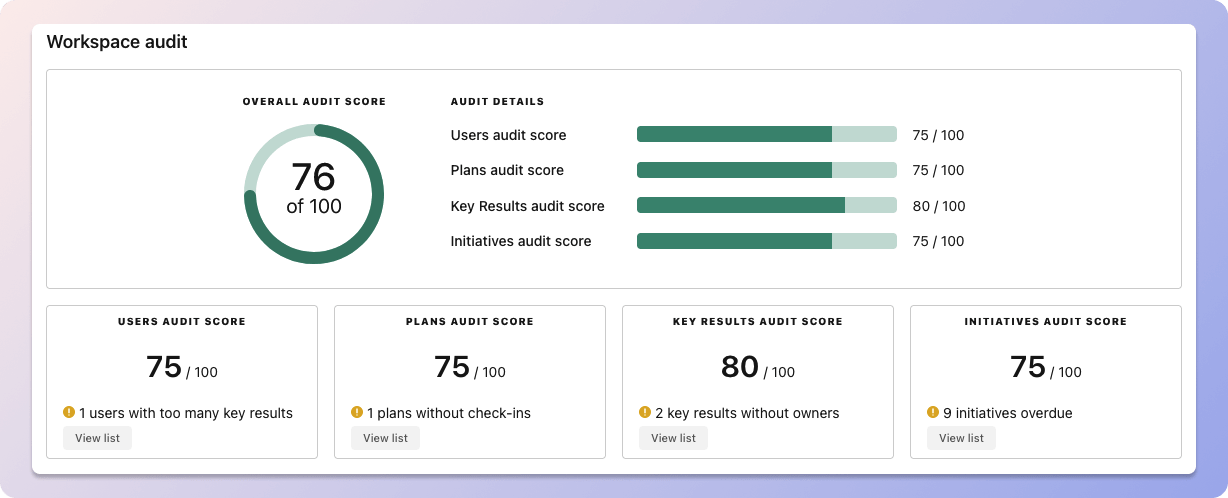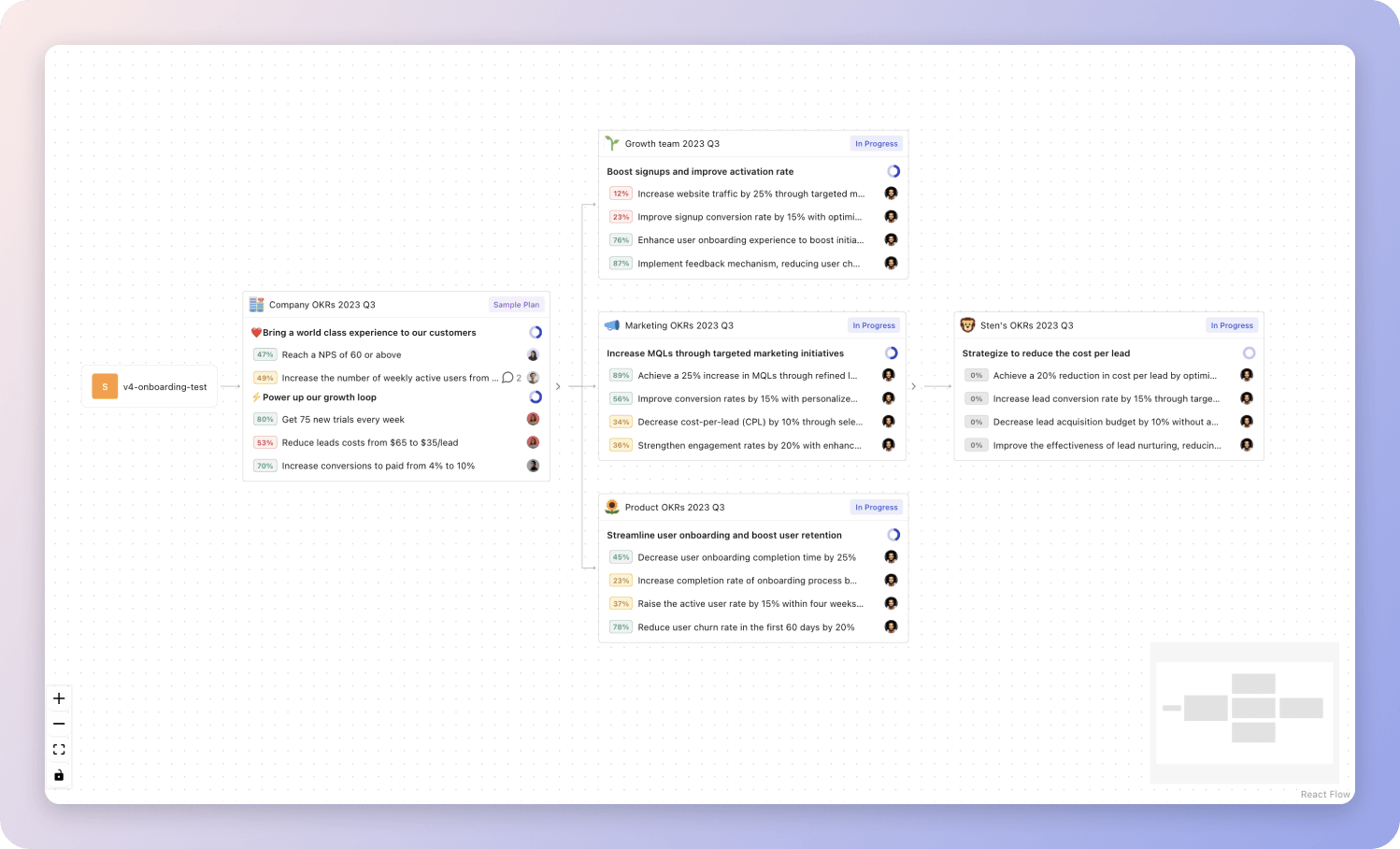1 OKR examples for Professionalism
What are Professionalism OKRs?
The Objective and Key Results (OKR) framework is a simple goal-setting methodology that was introduced at Intel by Andy Grove in the 70s. It became popular after John Doerr introduced it to Google in the 90s, and it's now used by teams of all sizes to set and track ambitious goals at scale.
Creating impactful OKRs can be a daunting task, especially for newcomers. Shifting your focus from projects to outcomes is key to successful planning.
We've tailored a list of OKRs examples for Professionalism to help you. You can look at any of the templates below to get some inspiration for your own goals.
If you want to learn more about the framework, you can read more about the OKR meaning online.
Best practices for managing your Professionalism OKRs
Generally speaking, your objectives should be ambitious yet achievable, and your key results should be measurable and time-bound (using the SMART framework can be helpful). It is also recommended to list strategic initiatives under your key results, as it'll help you avoid the common mistake of listing projects in your KRs.
Here are a couple of best practices extracted from our OKR implementation guide 👇
Tip #1: Limit the number of key results
The #1 role of OKRs is to help you and your team focus on what really matters. Business-as-usual activities will still be happening, but you do not need to track your entire roadmap in the OKRs.
We recommend having 3-4 objectives, and 3-4 key results per objective. A platform like Tability can run audits on your data to help you identify the plans that have too many goals.
 Tability's audit dashboard will highlight opportunities to improve OKRs
Tability's audit dashboard will highlight opportunities to improve OKRsTip #2: Commit to the weekly check-ins
Don't fall into the set-and-forget trap. It is important to adopt a weekly check-in process to get the full value of your OKRs and make your strategy agile – otherwise this is nothing more than a reporting exercise.
Being able to see trends for your key results will also keep yourself honest.
 Tability's check-ins will save you hours and increase transparency
Tability's check-ins will save you hours and increase transparencyTip #3: No more than 2 yellow statuses in a row
Yes, this is another tip for goal-tracking instead of goal-setting (but you'll get plenty of OKR examples below). But, once you have your goals defined, it will be your ability to keep the right sense of urgency that will make the difference.
As a rule of thumb, it's best to avoid having more than 2 yellow/at risk statuses in a row.
Make a call on the 3rd update. You should be either back on track, or off track. This sounds harsh but it's the best way to signal risks early enough to fix things.
Building your own Professionalism OKRs with AI
While we have some examples below, it's likely that you'll have specific scenarios that aren't covered here. There are 2 options available to you.
- Use our free OKRs generator
- Use Tability, a complete platform to set and track OKRs and initiatives
- including a GPT-4 powered goal generator
Best way to track your Professionalism OKRs
Quarterly OKRs should have weekly updates to get all the benefits from the framework. Reviewing progress periodically has several advantages:
- It brings the goals back to the top of the mind
- It will highlight poorly set OKRs
- It will surface execution risks
- It improves transparency and accountability
Spreadsheets are enough to get started. Then, once you need to scale you can use a proper OKR platform to make things easier.
 Tability's Strategy Map makes it easy to see all your org's OKRs
Tability's Strategy Map makes it easy to see all your org's OKRsIf you're not yet set on a tool, you can check out the 5 best OKR tracking templates guide to find the best way to monitor progress during the quarter.
Professionalism OKRs templates
We've covered most of the things that you need to know about setting good OKRs and tracking them effectively. It's now time to give you a series of templates that you can use for inspiration!
You will find in the next section many different Professionalism Objectives and Key Results. We've included strategic initiatives in our templates to give you a better idea of the different between the key results (how we measure progress), and the initiatives (what we do to achieve the results).
Hope you'll find this helpful!
OKRs to maintain a professional and engaged presence at work
Maintain a professional and engaged presence at work
Complete assigned tasks on time with high quality and seek opportunities for improvement
Seek feedback from colleagues and supervisors to enhance performance
Pay attention to detail and ensure the quality of work before submission
Regularly evaluate workflow and identify areas for improvement
Prioritize tasks and create a schedule to meet deadlines efficiently
Build and maintain positive relationships with colleagues and superiors through effective communication and collaboration
Actively listen to colleagues and superiors, showing genuine interest in their perspectives and ideas
Communicate clearly and concisely, both verbally and in written correspondence
Seek feedback from colleagues and superiors, and implement constructive criticism to improve collaboration
Offer assistance and support to colleagues and superiors whenever possible
Actively seek out additional responsibilities or projects to demonstrate enthusiasm and dedication
Offer assistance to teammates on their projects to showcase dedication and support
Take initiative and volunteer for tasks that align with personal interests and skills
Regularly communicate to superiors about eagerness to be involved in new projects and contribute
Seek feedback and suggestions from supervisors to identify areas where additional responsibilities can be taken on
Attend all meetings prepared and actively contribute to discussions
Follow up after meetings with action points, summaries, or additional research if needed
Engage in discussions by actively listening, sharing insights, and providing constructive input
Review meeting agenda beforehand and gather necessary materials or information
Participate in pre-meeting preparations, research topics, and formulate ideas or questions
More Professionalism OKR templates
We have more templates to help you draft your team goals and OKRs.
OKRs to secure Series A funding
OKRs to build a process orchestration system
OKRs to improve EV Program outcomes through competitive and strategic data analysis
OKRs to boost website conversion rate
OKRs to enhance team cross-functionality's overall performance
OKRs to significantly boost the volume of lead generation
OKRs resources
Here are a list of resources to help you adopt the Objectives and Key Results framework.
- To learn: Complete 2024 OKR cheat sheet
- Blog posts: ODT Blog
- Success metrics: KPIs examples